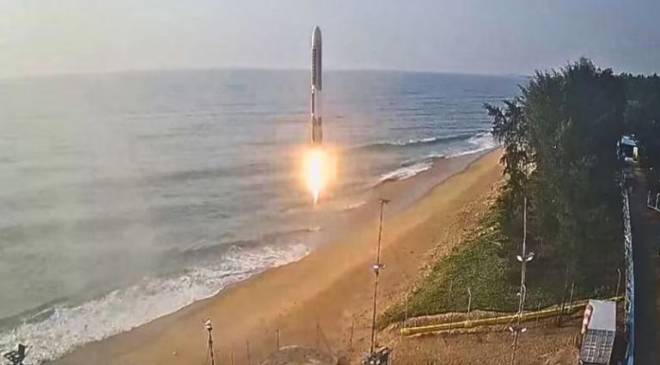BENGALURU: In a big boost for India’s private space industry, Agnikul Cosmos, an IIT-Madras-incubated startup, successfully launched on Thursday the world’s first rocket with a single-piece 3D-printed engine.
Read More: How Falguni Nayar Built Nykaa Into A Beauty E-Commerce Giant
The single-stage rocket, called ‘Agnibaan – Sub-Orbital Technology Demonstrator (SOrTeD)’, lifted off from India’s first private launchpad, Dhanush, at Sriharikota at 7.15am, marking the country’s first semi-cryogenic engine-powered rocket launch. It was powered by Agnikul’s Agnilet engine.
In the past two months, the startup had to call off the mission minutes before the scheduled lift-off twice — on April 7 and May 28. Thursday’s historic mission, Agnikul’s inaugural flight, demonstrated indigenous technologies, gathered crucial flight data and ensured optimal functioning of systems for their orbital launch vehicle, ‘Agnibaan’, in the future.
Agnikul co-founder and CEO Srinath Ravichandran called it the culmination of the team’s thousands of hours of reviews and hard work. Co-founder and COO Moin SPM said the project owes its success to the unwavering support of the firm’s advisors, investors, vendors, customers and well-wishers.
Unlike traditional-sounding rockets that launch from guiderails, SOrTeD lifted off vertically and followed a predetermined trajectory while performing a precisely orchestrated set of manoeuvres during flight.
Isro chairman S Somanath said: “The Department of Space and Isro congratulate Agnikul. The success involved many firsts, including a 3D-printed semi-cryogenic engine, flight-control systems demonstrating the prowess of indigenous design and innovation. It motivates Isro to support space startups and non-governmental entities for innovation to create a vibrant space ecosystem in the country.”
Read More: Gold Rates Today: Check Top City Wise Gold Prices In India On 31st May, 2024
The Agnikul team, consisting of more than 200 engineers, is guided by 45 former Isro scientists. Satyanarayanan R Chakravarthy of IIT-Madras (IITM), Agnikul’s founding advisor, said the firm was proud to present India’s first semi-cryo rocket engine, which is also the world’s most integrated single-shot 3D-printed piece. “It signals the ability to rapidly assemble rockets that is unparalleled.”
IITM director V Kamakoti noted the sky was no longer the limit for startups. “Very innovative, first time in the world, deep-core technology demonstrated today by Agnikul – a great inspiration for all young students to boldly take the entrepreneurship route and become employers,” Kamakoti said.
The success takes Agnikul a step closer to test-flying its flagship launch vehicle Agnibaan, a two-stage rocket designed to be highly customisable. “It is compatible with the mobile launchpad Dhanush, allowing for launch flexibility regardless of location and accommodating payloads ranging from 30kg to 300kg,” Agnikul said.
The firm has plans for an orbital mission towards the end of the financial year 2024-25 and regular customer flights from 2025.
Aside from showcasing the country’s first semi-cryogenic engine-powered rocket launch and utilising the first single-piece 3D-printed engine, SOrTeD had another first — Dhanush, established at the Satish Dhawan Space Centre, Isro’s spaceport in Sriharikota, on Nov 25, 2022.
Conceived and built as a product that enables the process of launching to be reliable and repeatable with consistency, Dhanush has two sections: The Agnikul Launch Pad (ALP) and the Agnikul mission control centre (AMCC). Critical systems connecting these two sections, which are 4km from each other, are designed to ensure 100% operationality during countdown.
Read More: Petrol, Diesel Price Today: Check Latest Fuel Prices In Your City On May 31
IN-SPACe chairman Pawan Goenka said: “The successful launch of SOrTeD is not just a milestone for Agnikul but marks a significant moment for private players contributing to growing India’s space sector… At IN-SPACe, we are committed to support all young pioneers as they help propel India to a leadership position in the global space arena.”



































